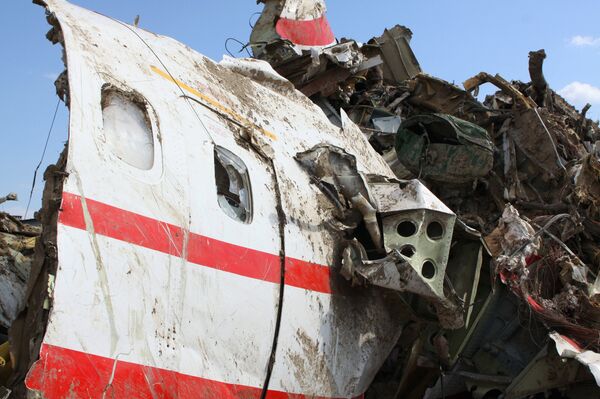A Polish air force spokesman dismissed Russian media reports that pilots of the Polish presidential plane, which crashed last year in western Russia, acted according to a secret instruction.
A Russian paper wrote, citing a Polish journalist, that the crew of the ill-fated aircraft, which crashed while landing in dangerous weather conditions on April 10, 2010, was not entitled to divert to another airport without the president's authorization.
"There were no secret instructions... Under the rules, it's up to the aircraft commander to choose at which airport to land... and the 'main passenger' should just be informed about that," Air Force spokesman Robert Kupracz told the TVN24 channel.
Komsomolskaya Pravda recently wrote that after the incident in Georgia, when Polish presidential plane pilot refused to land under gunfire, the late president Lech Kaczynski's administration issued a special instruction for pilots of the 36th Special Regiment of Aviation Transport, which flies top state officials.
"A Polish journalist (whose name is not disclosed for obvious reasons) said that the special aviation regiment that flies VIP passengers received a secret instruction, which said the plane could divert only on the permission from their main passenger," the paper wrote.
In August 2008, Lech Kaczynski got into a dispute with a pilot flying his plane to the Georgian capital of Tbilisi, demanding the pilot land regardless of dangerous conditions. However, the pilot disobeyed the order and landed in Baku, the capital of neighboring Azerbaijan.
Russia's Investigation Committee said it would check all information, including media reports, as part of its probe of the crash. The Moscow-based Interstate Aviation Committee (MAK) has completed its investigation but a separate Polish probe is ongoing.
"All information about facts and documents that are somehow related to the case will be thoroughly analyzed during the investigation, including media reports," investigators spokesman Vladimir Markin said.
The Russian probe is likely to take no less than two months, chief investigator Alexander Bastrykin said later in the day.
The secret instruction rumors were partially confirmed by Polish government spokesman Pawel Gras, who later withdrew the statement.
"Naturally, a secret instruction does exist, but I have no idea of the rules it might carry. I don't think that it mentions the diversion procedure. But [I] have no information," he told the RMF FM radio station.
Later, speaking at the TOK FM radio, he said that "there is no secret instruction on how to land."
"What the Komsomolskaya Pravda wrote is just lies and manipulation. Especially, when they cite an 'anonymous Polish journalist,'" he said.
The Moscow-based Interstate Aviation Committee (MAK), said in its report on the causes of the crash that the crew was under additional psychological pressure due to Polish Air Force Chief's presence in the cockpit and the expected negative reaction of the main passenger. Polish officials and experts criticized the report for putting "the full and one-sided blame on Polish pilots."
In response, Polish commission conducting a separate investigation into the Smolensk air crash said Russian air traffic controllers were under pressure, made a number of errors and failed to warn the Polish pilots that they were off course. The commission is expected to release its own report soon.
Russian Deputy Prime Minister Sergei Ivanov reiterated that under international aviation rules Russian traffic controllers could not prohibit the crew from performing a landing.
"There's nothing else to add to what has already been said... Air traffic controllers are not entitled to ban landing if the pilot in command or someone else aboard decides to land at all costs... And all aviation specialists are well aware of that," the vice premier said.
"It's well known that an air traffic controller can prohibit landing in two cases: when the runway is already in use or when distance between two aircraft does not allow safe landing," he added.
WARSAW, January 28 (RIA Novosti)




